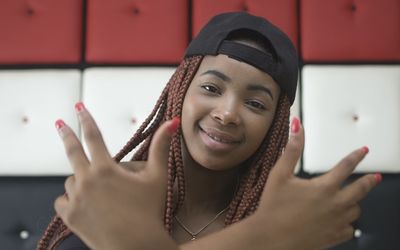LAST year, Charmaine Motlhabi, all of 18 years old, took a break from the business of making music to finish school, scoring distinctions in life science and business studies.
She claimed another for life orientation, but one might well ask why this subject was even necessary seeing as, since the age of 14, she’s been defining herself as a rapper called Chazz Le Hippie.
The name is an amalgamation of her nickname and street slang for someone who’s hip, all held together with a touch of French.
The trés cool nom de guerre couldn’t be more fitting — Chazz simply oozes pizzazz.
Of course, her stage name also has something of a voodoo twist to it, and once her tongue is unleashed, spitting deep-throated lyrics as though she were possessed, it’s easy to feel something wicked is coming.
However, for her, it’s simply "a personality where I can let go", and yet also, one she had to let go of temporarily for good grades’ sake.
"I had to ease on down for matric because, well, yeah, it’s for the future, you know. It was a one-year sacrifice for a whole lifetime."
Writing matric at a year-long remove from her stage persona also meant Chazz moved away from her beloved home environment of Kagiso, near Krugersdorp on the West Rand.
"My headmistress felt it was the right thing to do because when she saw where I was headed with my academic achievements, she thought that all the stress and strain at home could impact on my final year, so I wrote matric (at Krugersdorp High) in boarding school."
The "stress and strain" she speaks of refers to her being an orphan, having lost both her parents when she was just 11, and having to help her grandmother raise her eight-year-old brother.
"It wasn’t easy," she says. "We’d been living off child grants. Sometimes I would worry about whether we would have enough to eat because the money my gran would make from selling domestic odds and ends from her garage wouldn’t always cover everything."
And yet, despite everything, 2014 was "a big year" for Chazz. Turning disadvantage into art, writing from her personal experience of poverty and the death of her parents, she quickly came to the attention of the rap pack.
...
IN GRADE 11, as she started making her mark academically, she was noticed by a few hip-hop heavies. She was one of 14 young female rappers — don’t ever label her a "femcee", as the female equivalents of "emcees" or rappers, are often called — to make it into the Queen of Street Rap competition in Soweto.
"It was tough. It was the first time I was exposed to a big crowd. There were several rounds and it was all like this, this, this — but I did it!" she says, fingers clicking away.
"In the final, I came up against this Xhosa girl. Yo, yo yo. You don’t mess with them. They’re fast talkers. It’s in the clicks, their tongues that just go, go, go, and their attitude.
"It was hectic. I was intimidated but I did it — I won. Sometimes you just need to have a little faith in yourself."
Chazz says the competition took her career from fledgling to full-flight. "Suddenly people started taking my grind seriously."
A self-funded mix-tape of 15 songs called The Truth followed. "It sold like hot cakes! I couldn’t believe it."
Next thing, she had her own website and production commitments, with whole crews of creative types shooting music videos. "And then, just like this," she says, red nails flashing as her fingers snap, "it was all over. I had to do matric."
Thankfully the re-emergence of Charmaine Motlhabi, the studious, serious person who is calm and concentrated on what she wants from life, did not completely overshadow "the louder me — my wild side".
Having figured out early on how to blend the benefits of both personas towards a greater life goal, Chazz roped a few friends — "my creative team" — into a social media publicity project called "Hippie rebirth".
...
AIMED at getting her music career back on track, the project vouches for her yen to use limited resources and general marketing tricks in putting the hop back in Le Hippie. "We wanted to get my brand out there again, the Hippie-brand," she says.
Gone are the days of the little girl with the baseball cap worn backwards. "I’m a woman now," she says as she smoothes creases from her tight little black number, ready for another photoshoot.
Striking a pose in the dusty street outside her gran’s paint-flaking home in Kagiso, she doesn’t quite cut it as a hipster; she looks more corporate.
Has the rebirth perhaps gone too far for Madame Le Hippie?
"No," she says. "This is me, plain old Charmaine" — the person on the flipside of Chazz who is about to enter her first year at the University of Johannesburg, where she will be studying law.
She explains that the rebirth is really "something separate, something for the fans".
It includes a T-shirt emblazoned with the words "Ma Hippie".
"My team and I thought of Justin Bieber, how his fans are called Beliebers.
"So we came up with this idea of something similar, something tangible, so people can feel they belong to a bigger movement," Chazz says.
It’s also hoped that sales of the T-shirt will help fund Chazz’s next mix-tape.
...
SHE reiterates that, aside from all the industry-related morphing, her singing will essentially remain the same.
"My delivery might change a little, being less raw than it used to be, but I will still be singing in motswako" — a rap style that’s part vernacular (in her case Setswana), part "everything else".
With songs such as Loss Gaat and Fast Traap, her spoken word skirmishes with life’s lemons, but also with things less bitter. Her vocals have a distinct Afrikaans inflection, as if she’s singing in a kind of "Afritswana".
Chazz calls it "kasi — the language people speak around me. I mix in other languages as much as possible because, that way, I reach a bigger audience, making my music more marketable."
The gritty video for Loss Gaat, shot in the midst of its subject matter, poor white people, has been viewed more than 15,000 times on YouTube.
"I wanted to sing about the misconception that it’s only black people that are struggling," she says. This kind of social consciousness, at a time when the country’s racial relations seem a little frayed, is just one aspect that sets her music apart.
Her entrepreneurial skill also means she’s not just a rapper, but a rapreneur.
"Nah", she laughs loudly. "I’m just Chazz!"

Charmaine Motlhabi took a year-long break from her music career to concentrate on her studies, and is now pursuing a law degree — but Chazz Le Hippie will continue to play a large part in her life. Picture: EUGENE GODDARD
LAST year, Charmaine Motlhabi, all of 18 years old, took a break from the business of making music to finish school, scoring distinctions in life science and business studies.
She claimed another for life orientation, but one might well ask why this subject was even necessary seeing as, since the age of 14, she’s been defining herself as a rapper called Chazz Le Hippie.
The name is an amalgamation of her nickname and street slang for someone who’s hip, all held together with a touch of French.
The trés cool nom de guerre couldn’t be more fitting — Chazz simply oozes pizzazz.
Of course, her stage name also has something of a voodoo twist to it, and once her tongue is unleashed, spitting deep-throated lyrics as though she were possessed, it’s easy to feel something wicked is coming.
However, for her, it’s simply "a personality where I can let go", and yet also, one she had to let go of temporarily for good grades’ sake.
"I had to ease on down for matric because, well, yeah, it’s for the future, you know. It was a one-year sacrifice for a whole lifetime."
Writing matric at a year-long remove from her stage persona also meant Chazz moved away from her beloved home environment of Kagiso, near Krugersdorp on the West Rand.
"My headmistress felt it was the right thing to do because when she saw where I was headed with my academic achievements, she thought that all the stress and strain at home could impact on my final year, so I wrote matric (at Krugersdorp High) in boarding school."
The "stress and strain" she speaks of refers to her being an orphan, having lost both her parents when she was just 11, and having to help her grandmother raise her eight-year-old brother.
"It wasn’t easy," she says. "We’d been living off child grants. Sometimes I would worry about whether we would have enough to eat because the money my gran would make from selling domestic odds and ends from her garage wouldn’t always cover everything."
And yet, despite everything, 2014 was "a big year" for Chazz. Turning disadvantage into art, writing from her personal experience of poverty and the death of her parents, she quickly came to the attention of the rap pack.
...
IN GRADE 11, as she started making her mark academically, she was noticed by a few hip-hop heavies. She was one of 14 young female rappers — don’t ever label her a "femcee", as the female equivalents of "emcees" or rappers, are often called — to make it into the Queen of Street Rap competition in Soweto.
"It was tough. It was the first time I was exposed to a big crowd. There were several rounds and it was all like this, this, this — but I did it!" she says, fingers clicking away.
"In the final, I came up against this Xhosa girl. Yo, yo yo. You don’t mess with them. They’re fast talkers. It’s in the clicks, their tongues that just go, go, go, and their attitude.
"It was hectic. I was intimidated but I did it — I won. Sometimes you just need to have a little faith in yourself."
Chazz says the competition took her career from fledgling to full-flight. "Suddenly people started taking my grind seriously."
A self-funded mix-tape of 15 songs called The Truth followed. "It sold like hot cakes! I couldn’t believe it."
Next thing, she had her own website and production commitments, with whole crews of creative types shooting music videos. "And then, just like this," she says, red nails flashing as her fingers snap, "it was all over. I had to do matric."
Thankfully the re-emergence of Charmaine Motlhabi, the studious, serious person who is calm and concentrated on what she wants from life, did not completely overshadow "the louder me — my wild side".
Having figured out early on how to blend the benefits of both personas towards a greater life goal, Chazz roped a few friends — "my creative team" — into a social media publicity project called "Hippie rebirth".
...
AIMED at getting her music career back on track, the project vouches for her yen to use limited resources and general marketing tricks in putting the hop back in Le Hippie. "We wanted to get my brand out there again, the Hippie-brand," she says.
Gone are the days of the little girl with the baseball cap worn backwards. "I’m a woman now," she says as she smoothes creases from her tight little black number, ready for another photoshoot.
Striking a pose in the dusty street outside her gran’s paint-flaking home in Kagiso, she doesn’t quite cut it as a hipster; she looks more corporate.
Has the rebirth perhaps gone too far for Madame Le Hippie?
"No," she says. "This is me, plain old Charmaine" — the person on the flipside of Chazz who is about to enter her first year at the University of Johannesburg, where she will be studying law.
She explains that the rebirth is really "something separate, something for the fans".
It includes a T-shirt emblazoned with the words "Ma Hippie".
"My team and I thought of Justin Bieber, how his fans are called Beliebers.
"So we came up with this idea of something similar, something tangible, so people can feel they belong to a bigger movement," Chazz says.
It’s also hoped that sales of the T-shirt will help fund Chazz’s next mix-tape.
...
SHE reiterates that, aside from all the industry-related morphing, her singing will essentially remain the same.
"My delivery might change a little, being less raw than it used to be, but I will still be singing in motswako" — a rap style that’s part vernacular (in her case Setswana), part "everything else".
With songs such as Loss Gaat and Fast Traap, her spoken word skirmishes with life’s lemons, but also with things less bitter. Her vocals have a distinct Afrikaans inflection, as if she’s singing in a kind of "Afritswana".
Chazz calls it "kasi — the language people speak around me. I mix in other languages as much as possible because, that way, I reach a bigger audience, making my music more marketable."
The gritty video for Loss Gaat, shot in the midst of its subject matter, poor white people, has been viewed more than 15,000 times on YouTube.
"I wanted to sing about the misconception that it’s only black people that are struggling," she says. This kind of social consciousness, at a time when the country’s racial relations seem a little frayed, is just one aspect that sets her music apart.
Her entrepreneurial skill also means she’s not just a rapper, but a rapreneur.
"Nah", she laughs loudly. "I’m just Chazz!"




















Change: 2.60%
Change: 2.92%
Change: 4.80%
Change: 2.21%
Change: 2.84%
Data supplied by Profile Data
Change: 2.04%
Change: 2.00%
Change: 2.60%
Change: 0.00%
Change: 1.95%
Data supplied by Profile Data
Change: -0.76%
Change: -1.21%
Change: -1.72%
Change: -1.94%
Change: -0.67%
Data supplied by Profile Data
Change: -2.35%
Change: -1.89%
Change: -2.67%
Change: -1.92%
Change: 1.74%
Data supplied by Profile Data